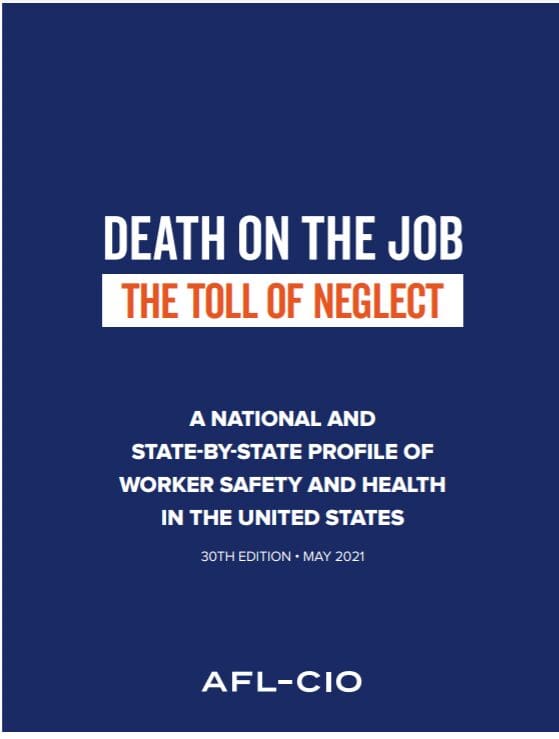18 Important Things You Need to Know from the 2021 Death on the Job Report

For the 30th year, the AFL-CIO has produced the 2021 edition of Death on the Job: The Toll of Neglect report on the state of safety and health protections for America’s working families. Since the passage of the Occupational Safety and Health Act 50 years ago, federal job safety agencies have issued many important regulations on safety hazards, strengthened enforcement and expanded worker rights. The toll of workplace injury, illness and death remains too high, and too many workers remain at serious risk. There is much more work to be done.
Here are 18 important things from the 2021 Death on the Job report you need to know. In 2019:
1. 275 U.S. workers, on average, died each day from hazardous working conditions.
2. 5,333 workers were killed on the job in the United States.
3. An estimated 95,000 workers died from occupational diseases.
4. The overall job fatality rate was 3.5 per 100,000 workers, the same as the previous year.
5. Latino and Black worker fatalities increased; these workers are at greater risk of dying on the job than all workers.
6. Employers reported nearly 3.5 million work-related injuries and illnesses.
7. Musculoskeletal disorders continue to make up the largest portion (30%) of work-related injuries and illnesses.
8. Underreporting is widespread—the true toll of work-related injuries and illnesses is 7.0 million to 10.5 million each year.
9. States with the highest fatality rates in 2019 were: Alaska, Wyoming, North Dakota, Montana and West Virginia.
10. Industries with the highest fatality rates in 2019 were: agriculture, forestry, and fishing and hunting; mining, quarrying, and oil and gas extraction; transportation and warehousing; construction; and wholesale trade.
11. America’s workplaces have been a primary source of COVID-19 outbreaks, with thousands of workers infected and dying. However, workplace infection and outbreak information is limited because there is no national surveillance system.
12. Workplace violence deaths increased to 841 in 2019, while more than 30,000 violence-related lost-time injuries were reported.
13. Workplace violence is the third-leading cause of workplace death. There were 454 worker deaths that were workplace homicides.
14. Women workers are at greater risk of violence than men; they suffered two-thirds of the lost-time injuries related to workplace violence, and were five times more likely to be killed by a relative or domestic partner in the workplace than men.
15. Deaths among all Latino workers increased in 2019: 1,088 deaths, compared with 961 in 2018. Some 66% of those who died were immigrants.
16. The Black worker fatality rate of 3.6 per 100,000 workers continues to be higher than the national average. In 2019, 634 Black workers died on the job—the highest number in more than two decades.
17. Workers 65 or older have nearly three times the risk of dying on the job as other workers, with a fatality rate of 9.4 per 100,000 workers in 2019.
18. The cost of job injuries and illnesses is enormous—estimated at $250 billion to $330 billion a year.
There is a lot we can do to address these numbers, which are much too high. Read the full report to learn more about the solutions.
Kenneth Quinnell
Tue, 05/04/2021 – 09:40
